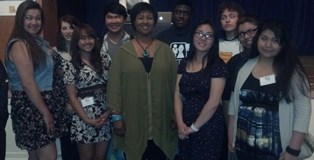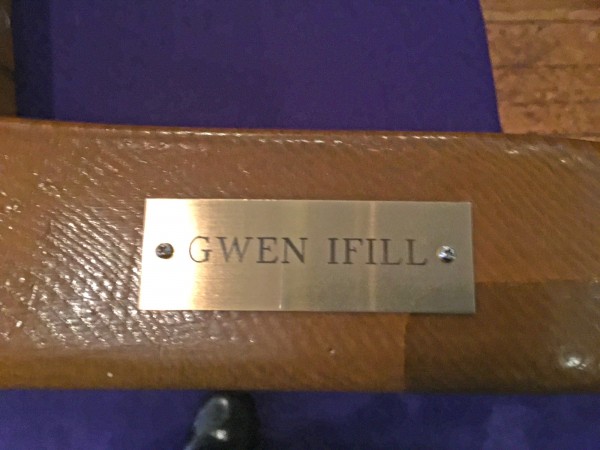 Dr. Mae Jemison, surrounded by students at a science workshop yesterday in Portland |
Portland Public School students were treated to workshop with Dr. Mae Jemison, the first Black woman to travel in space, on June 5.
The workshop was part of the North American World Environment Day activities, sponsored by Bayer Corporation. This year's theme is "Reducing your foodprint."
"What we like to do is work with teachers and students to really have them learn something in a very experiential way," says Jemison. "When you experience something, you learn it better. And we know, especially when you are working with teenagers that they need to use all their motivation and enthusiasm to apply to a problem."
More than 70 students from Roosevelt, Grant, Jefferson and Lincoln high school participated in the workshop at Roosevelt. Jemison and a team of environmental scientists gave the students a series of problems to work on over the course of the morning and then tasked them with presenting solutions later on in the day.
 Problems ranged from designing teen activities to help support the environment in Portland to figuring out how to create green jobs that improve the economy.
Problems ranged from designing teen activities to help support the environment in Portland to figuring out how to create green jobs that improve the economy.
They also discussed 'foodprints' and 'water prints.' Specifically, Jemison and the environmental scientists emphasized not throwing away so much food and not letting wasted water go down the drain. She says it was important to help them understand the connection between food, water, the environment and health.
The methodology was developed for Jemison's The Earth We Share, or TEWS, curriculum, which is part of the Dorothy Jemison Foundation for Excellence. It's named after Jemison's mother, who was a teacher in Chicago Public Schools for 25 years.
She says that science literacy is important not just for people who choose to pursue science as a profession, but to people in fields ranging from corporate executives to beauticians to politicians because they need to know how the world works too.
One of the objectives of TEWS is to help maintain children's interest in science. Jemison says that children have a curiosity and love of science that often gets lost because of a lack of hands-on experiences as they get older.
 "Kids ask the 'What if' questions," she says. "You know, about the bugs, the snails and all of those kinds of things. The stuff between the couch. Kids want to know about how the world works and it's actually about their natural learning techniques – to try things and experience things.
"Kids ask the 'What if' questions," she says. "You know, about the bugs, the snails and all of those kinds of things. The stuff between the couch. Kids want to know about how the world works and it's actually about their natural learning techniques – to try things and experience things.
"I think it's our methodology that we use in school that starts to be a deterrent to this natural curiosity. By the time we get to third or fourth grade, we run into a lot of teachers who are not as versed in doing science training so they hold remotely to books."
She says maintaining interest in science is about allowing children to develop their natural tendencies and giving them opportunities to learn about the difference sciences and work in those areas. When students try to do activities, that's what helps them hold on to the experience.
"You learn and you watch the butterfly grow," says Jemison. "You look at the cocoon and the chrysalis and you see what happens to the butterfly. You wire the house so you can see electrical pathways and understand when something is parallel or in series. Those are the things you remember."
Another important component is making the lessons relevant, she adds.
Part of the TEWS curriculum is to give students open-ended questions. According to Jemison, it's about letting students use their own innate motivation and creativity.
 During the Roosevelt activity, students presented solutions that ranged from people getting tax breaks for using alternative energy production sources in their homes to having a pollution police that forces polluters to do community service.
During the Roosevelt activity, students presented solutions that ranged from people getting tax breaks for using alternative energy production sources in their homes to having a pollution police that forces polluters to do community service.
Jemison says that while the solutions were important, she and the environmental scientists really stressed the process. They wanted students to think about things and hold on to the information.
"One of the most exciting things that happened to me this afternoon is when one of the young women came up to me and said she's on the sustainability council at her school and this gave her some different ideas and different ways to think about things," says Jemison. "Even the environmental scientists that we had there said that they had an opportunity to think about the world a little bit differently as they interacted with students."






















































































































































































































































































































